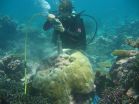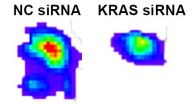Study finds Alzheimer's drug may reduce the urge to binge eat
2014-11-13
(Press-News.org) (Boston) - The Alzheimer's drug memantine may perform double-duty helping binge eaters control their compulsion. Researchers have demonstrated that memantine, a neuroprotective drug, may reduce the addictive and impulsive behavior associated with binge eating.
The Boston University School of Medicine (BUSM) study, which appears online in Neuopsychopharmacology, also found that a specific area in the brain, the nucleus accumbens, which is responsible for addictive behaviors, facilitates the effects of memantine.
Binge-eating disorder is a prevalent illness in America, affecting more than 10 million people. It is characterized by periods of excessive uncontrolled consumption of food, followed by uncomfortable fullness and feelings of self-disgust. New evidence indicates that changes in brain chemistry reflecting the addictive nature of binge eating may parallel drug and alcohol addiction.
Using an experimental model to simulate binge-eating behavior, researchers were able to identify the area of the brain associated with binge-eating and then suppress the behavior by applying memantine directly into that area.
"We found that memantine, which blocks glutamate NMDA receptors, blocks binge eating of junk food, blocks the strength of cues associated with junk food and blocks the compulsivity associated with binge eating," explained senior author Pietro Cottone, PhD, an associate professor of pharmacology and psychiatry at BUSM and co-director of the Laboratory of Addictive Disorders.
This research opens new avenues for binge eating treatment especially since memantine is a drug already approved for other indications. "Individuals with binge eating disorder have a very poor quality of life and decreased lifespan. Our study gives a better understanding of the underpinning neurobiological mechanisms of the disorder," added coauthor Valentina Sabino, PhD, assistant professor of pharmacology and psychiatry at BUSM and co-director of the Laboratory of Addictive Disorders.
INFORMATION:
Other researchers participating in this study included: Karen Smith, PhD (BUSM), Rahul Rao, MA (BUSM), Clara Velázquez-Sánchez, PhD (BUSM), Marta Valenza, PhD (BUSM), Chiara Giuliano, PhD (University of Cambridge, UK) and Barry Everitt, ScD (University of Cambridge, UK).
This work was supported by grant numbers DA030425, MH091945, and MH093650A1 from the National Institute on Drug Abuse (NIDA) and the National Institute of Mental Health (NIMH), by the Peter Paul Career Development Professorship (to P.C.), the McManus Charitable Trust (to V.S.) and by Boston University's Undergraduate Research Opportunities Program (UROP).
Contact: Gina DiGravio, 617-638-8480, ginad@bu.edu
ELSE PRESS RELEASES FROM THIS DATE:
2014-11-13
The Earth's oceans are thought to have taken up about one quarter of the carbon dioxide (CO2) that humans pumped into the atmosphere in the past 2 decades. While this drives acidification and has consequences for sea life, it also moderates the rate of climate change.
Researchers recently set out to create a global model of CO2 uptake using fine-scale observations on a global scale. Between 1998 and 2011, they found strong interannual variations, with the Pacific Ocean dominating the global flux variability.
"Shipboard surface water CO2 measurements are the backbone ...
2014-11-13
The ocean is warming steadily and setting up the conditions for stronger El Niño weather events, a new study has shown.
A team of US, Australian, and Canadian researchers sampled corals from a remote island in Kiribati to build a 60-year record of ocean surface temperature and salinity.
"The trend is unmistakeable, the ocean's primed for more El Niño events," says lead-author Dr Jessica Carilli, now based at the University of Massachusetts, Boston.
Team member Dr Helen McGregor from the Research School of Earth Sciences at The Australian National University ...
2014-11-13
HOUSTON - (Nov. 13, 2014) - While feelings of disgust can increase behaviors like lying and cheating, cleanliness can help people return to ethical behavior, according to a recent study by marketing experts at Rice University, Pennsylvania State University and Arizona State University. The study highlights the powerful impact emotions have on individual decision-making.
"As an emotion, disgust is designed as a protection," said Vikas Mittal, the J. Hugh Liedtke Professor of Marketing at Rice's Jones Graduate School of Business. "When people feel disgusted, they tend to ...
2014-11-13
Half a million objects, including debris, satellites, and the International Space Station, orbit the planet in the thermosphere, the largest layer of Earth's atmosphere. To predict the orbits--and potential collisions--of all this stuff, scientists must forecast the weather in the thermosphere.
Researchers who analyzed the role that gravitational effects of the Moon have on the thermosphere found that satellites taking different paths around the planet--circling over the poles, around the equator, or any route in between--will experience different levels of lunar-induced ...
2014-11-13
CHAPEL HILL, NC - Researchers from the UNC School of Medicine and colleagues at The University of Texas MD Anderson Cancer Center have developed a new approach to block the KRAS oncogene, one of the most frequently mutated genes in human cancer. The approach, led by Chad Pecot, MD, an assistant professor of medicine at UNC, offers another route to attack KRAS, which has proven to be an elusive and frustrating target for drug developers.
The new method relies upon a specifically sequenced type of small interfering RNA - or siRNA. The findings, published in the journal ...
2014-11-13
Irvine, Calif., Nov. 13, 2014 -- A new bloodstream infection test created by UC Irvine researchers can speed up diagnosis times with unprecedented accuracy, allowing physicians to treat patients with potentially deadly ailments more promptly and effectively.
The UCI team, led by Weian Zhao, assistant professor of pharmaceutical sciences, developed a new technology called Integrated Comprehensive Droplet Digital Detection. In as little as 90 minutes, IC 3D can detect bacteria in milliliters of blood with single-cell sensitivity; no cell culture is needed.
The work appears ...
2014-11-13
The Sudbury Basin located in Ontario, Canada is one of the largest known impact craters on Earth, as well as one of the oldest due to its formation more than 1.8 billion years ago. Researchers who took samples from the site and subjected them to a detailed geochemical analysis say that a comet may have hit the area to create the crater.
"Our analysis revealed a chondritic platinum group element signature within the crater's fallback deposits; however, the distribution of these elements within the impact structure and other constraints suggest that the impactor was a comet. ...
2014-11-13
Among overweight and obese adults who had asthma and participated in weight loss programs, more severe asthma, male sex, and improvements in eating behaviors were all linked with better success at losing weight.
The finding that individuals with more severe asthma may have a greater motivation to lose weight suggests that these individuals should be targeted for intervention. Also, gender tailoring of weight loss programs may be useful to enhance weight loss success, said Lisa Wood, senior author of the Respirology study.
INFORMATION: ...
2014-11-13
People can gauge the accuracy of their decisions, even if their decision making performance itself is no better than chance, according to a new study published in Psychological Science, a journal of the Association for Psychological Science.
In the study, people who showed chance-level decision making still reported greater confidence about decisions that turned out to be accurate and less confidence about decisions that turned out to be inaccurate. The findings suggest that the participants must have had some unconscious insight into their decision making, even though ...
2014-11-13
Philadelphia, PA (November 13, 2014) -- Patients on dialysis are very vulnerable during emergencies or disasters, but many are unprepared for such situations, according to two studies that will be presented at ASN Kidney Week 2014 November 11¬-16 at the Pennsylvania Convention Center in Philadelphia, PA.
Dialysis patients are highly dependent on technologies to sustain their lives, with ongoing needs for transportation, electricity, and water for the dialysis apparatus. Interruption of these needs by a natural disaster can be devastating.
Naoka Murakami, MD, PhD ...
LAST 30 PRESS RELEASES:
[Press-News.org] Study finds Alzheimer's drug may reduce the urge to binge eat

